Analysis of Medication Side Effects and Frailty Syndrome: A Case Study
VerifiedAdded on 2023/01/12
|19
|6141
|37
Case Study
AI Summary
This case study examines the susceptibility to medication side effects within the context of frailty syndrome, focusing on the elderly population. It defines frailty, long-term conditions, and polypharmacy, exploring the causes of polypharmacy, prevalence and demographics, adverse reactions, and consequences of polypharmacy. The study also investigates the role of health professionals in managing unacceptable polypharmacy, including the advantages of deprescribing. The case study utilizes the Comprehensive Geriatric Assessment (CGA) as a critical tool for analyzing and managing medication side effects. It also highlights the different frailty tools available such as Gait speed, grip strength and clinical frailty scale. The study highlights the importance of careful medication management to minimize adverse effects, reduce the risk of falls and injuries, and improve the quality of life for frail elderly individuals. This analysis aims to provide a comprehensive understanding of the challenges and strategies associated with medication management in this vulnerable population.
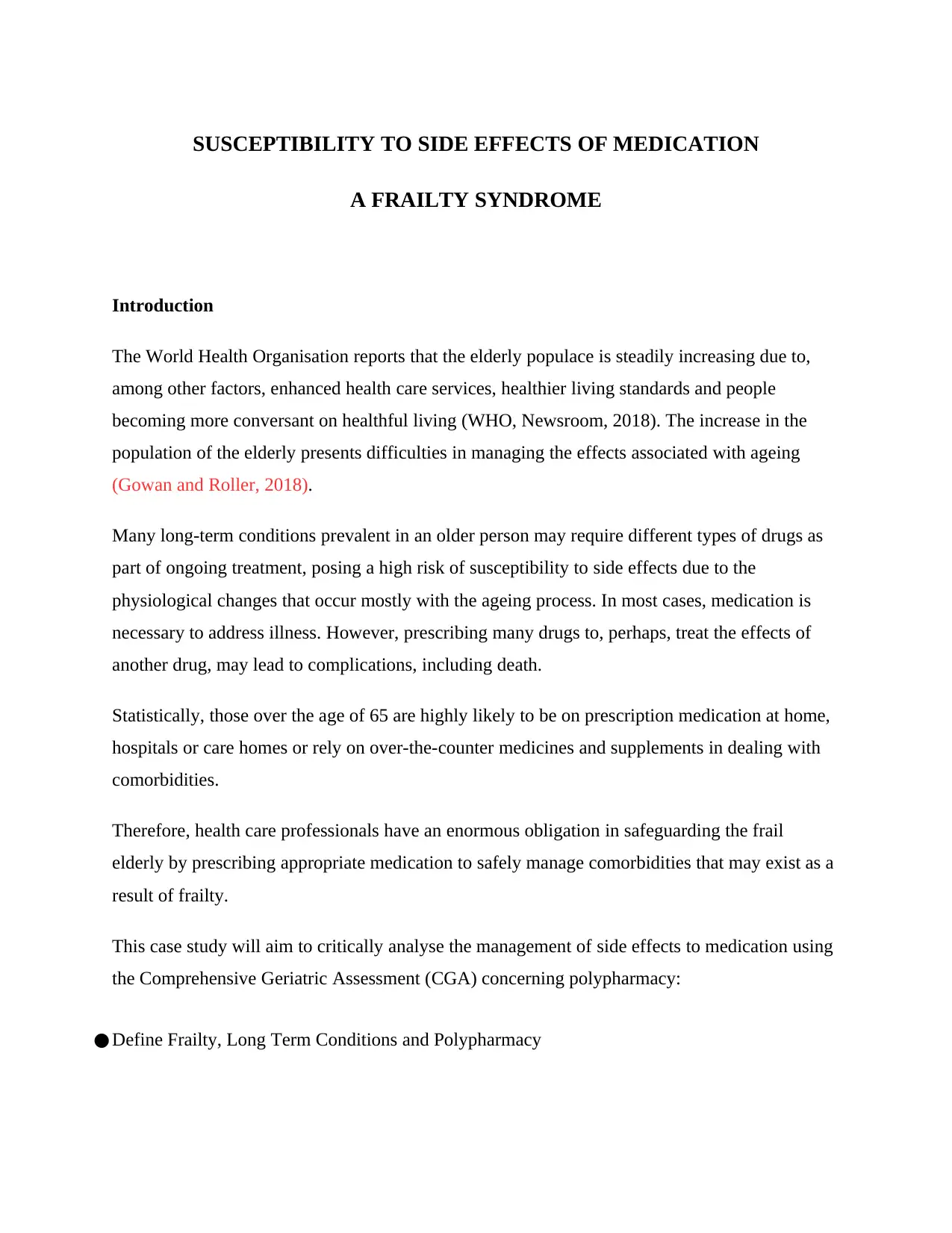
SUSCEPTIBILITY TO SIDE EFFECTS OF MEDICATION
A FRAILTY SYNDROME
Introduction
The World Health Organisation reports that the elderly populace is steadily increasing due to,
among other factors, enhanced health care services, healthier living standards and people
becoming more conversant on healthful living (WHO, Newsroom, 2018). The increase in the
population of the elderly presents difficulties in managing the effects associated with ageing
(Gowan and Roller, 2018).
Many long-term conditions prevalent in an older person may require different types of drugs as
part of ongoing treatment, posing a high risk of susceptibility to side effects due to the
physiological changes that occur mostly with the ageing process. In most cases, medication is
necessary to address illness. However, prescribing many drugs to, perhaps, treat the effects of
another drug, may lead to complications, including death.
Statistically, those over the age of 65 are highly likely to be on prescription medication at home,
hospitals or care homes or rely on over-the-counter medicines and supplements in dealing with
comorbidities.
Therefore, health care professionals have an enormous obligation in safeguarding the frail
elderly by prescribing appropriate medication to safely manage comorbidities that may exist as a
result of frailty.
This case study will aim to critically analyse the management of side effects to medication using
the Comprehensive Geriatric Assessment (CGA) concerning polypharmacy:
● Define Frailty, Long Term Conditions and Polypharmacy
A FRAILTY SYNDROME
Introduction
The World Health Organisation reports that the elderly populace is steadily increasing due to,
among other factors, enhanced health care services, healthier living standards and people
becoming more conversant on healthful living (WHO, Newsroom, 2018). The increase in the
population of the elderly presents difficulties in managing the effects associated with ageing
(Gowan and Roller, 2018).
Many long-term conditions prevalent in an older person may require different types of drugs as
part of ongoing treatment, posing a high risk of susceptibility to side effects due to the
physiological changes that occur mostly with the ageing process. In most cases, medication is
necessary to address illness. However, prescribing many drugs to, perhaps, treat the effects of
another drug, may lead to complications, including death.
Statistically, those over the age of 65 are highly likely to be on prescription medication at home,
hospitals or care homes or rely on over-the-counter medicines and supplements in dealing with
comorbidities.
Therefore, health care professionals have an enormous obligation in safeguarding the frail
elderly by prescribing appropriate medication to safely manage comorbidities that may exist as a
result of frailty.
This case study will aim to critically analyse the management of side effects to medication using
the Comprehensive Geriatric Assessment (CGA) concerning polypharmacy:
● Define Frailty, Long Term Conditions and Polypharmacy
Paraphrase This Document
Need a fresh take? Get an instant paraphrase of this document with our AI Paraphraser
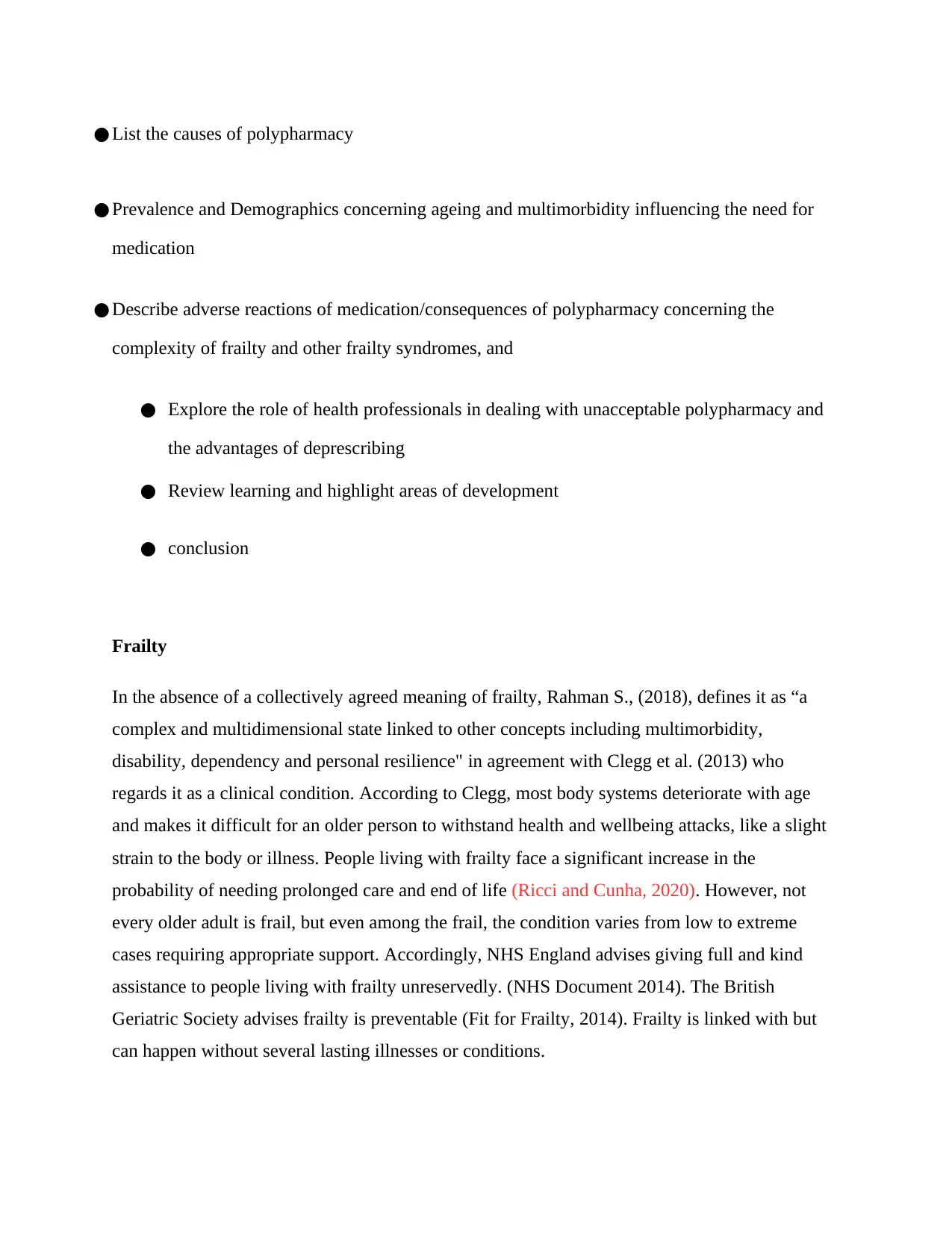
● List the causes of polypharmacy
● Prevalence and Demographics concerning ageing and multimorbidity influencing the need for
medication
● Describe adverse reactions of medication/consequences of polypharmacy concerning the
complexity of frailty and other frailty syndromes, and
● Explore the role of health professionals in dealing with unacceptable polypharmacy and
the advantages of deprescribing
● Review learning and highlight areas of development
● conclusion
Frailty
In the absence of a collectively agreed meaning of frailty, Rahman S., (2018), defines it as “a
complex and multidimensional state linked to other concepts including multimorbidity,
disability, dependency and personal resilience" in agreement with Clegg et al. (2013) who
regards it as a clinical condition. According to Clegg, most body systems deteriorate with age
and makes it difficult for an older person to withstand health and wellbeing attacks, like a slight
strain to the body or illness. People living with frailty face a significant increase in the
probability of needing prolonged care and end of life (Ricci and Cunha, 2020). However, not
every older adult is frail, but even among the frail, the condition varies from low to extreme
cases requiring appropriate support. Accordingly, NHS England advises giving full and kind
assistance to people living with frailty unreservedly. (NHS Document 2014). The British
Geriatric Society advises frailty is preventable (Fit for Frailty, 2014). Frailty is linked with but
can happen without several lasting illnesses or conditions.
● Prevalence and Demographics concerning ageing and multimorbidity influencing the need for
medication
● Describe adverse reactions of medication/consequences of polypharmacy concerning the
complexity of frailty and other frailty syndromes, and
● Explore the role of health professionals in dealing with unacceptable polypharmacy and
the advantages of deprescribing
● Review learning and highlight areas of development
● conclusion
Frailty
In the absence of a collectively agreed meaning of frailty, Rahman S., (2018), defines it as “a
complex and multidimensional state linked to other concepts including multimorbidity,
disability, dependency and personal resilience" in agreement with Clegg et al. (2013) who
regards it as a clinical condition. According to Clegg, most body systems deteriorate with age
and makes it difficult for an older person to withstand health and wellbeing attacks, like a slight
strain to the body or illness. People living with frailty face a significant increase in the
probability of needing prolonged care and end of life (Ricci and Cunha, 2020). However, not
every older adult is frail, but even among the frail, the condition varies from low to extreme
cases requiring appropriate support. Accordingly, NHS England advises giving full and kind
assistance to people living with frailty unreservedly. (NHS Document 2014). The British
Geriatric Society advises frailty is preventable (Fit for Frailty, 2014). Frailty is linked with but
can happen without several lasting illnesses or conditions.
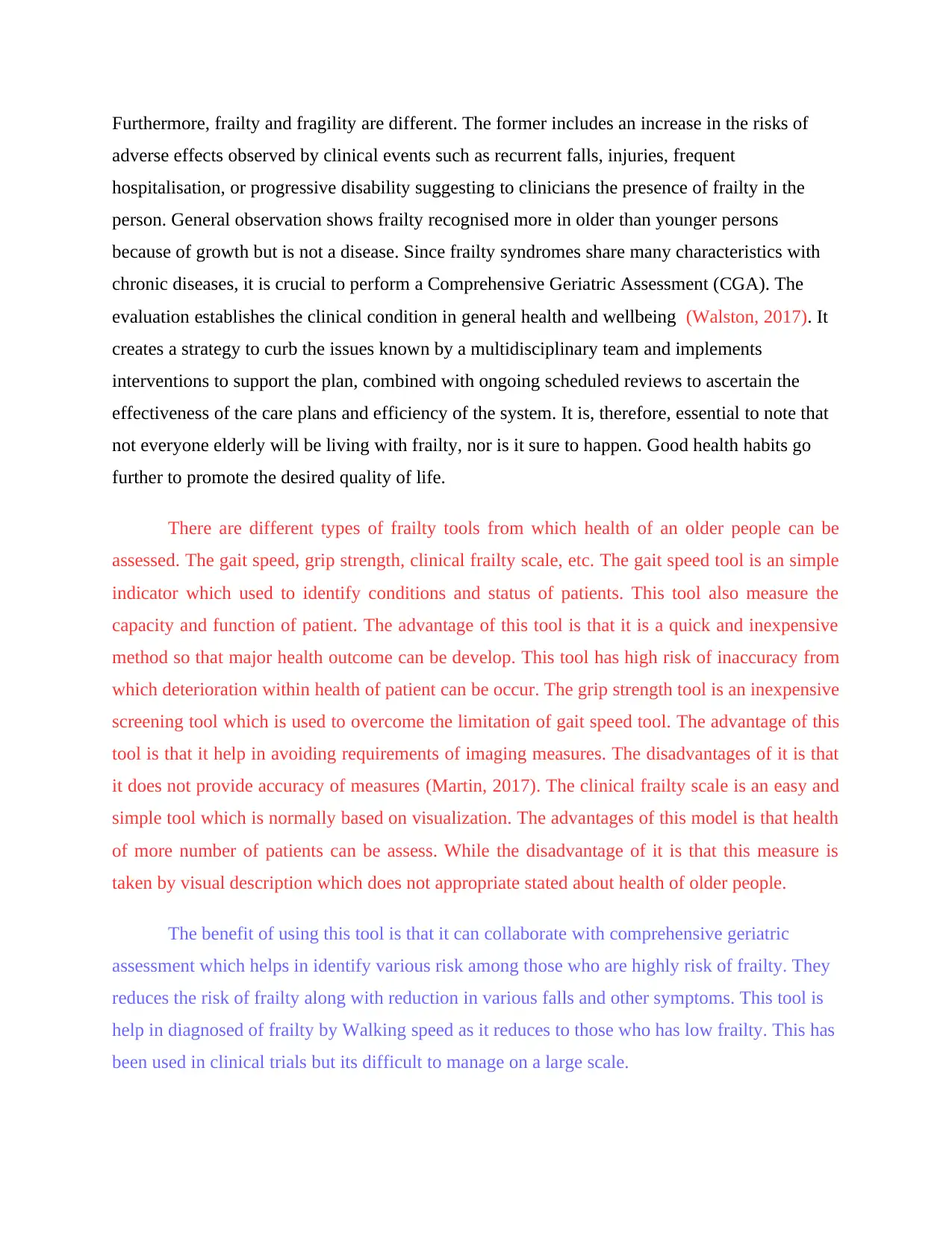
Furthermore, frailty and fragility are different. The former includes an increase in the risks of
adverse effects observed by clinical events such as recurrent falls, injuries, frequent
hospitalisation, or progressive disability suggesting to clinicians the presence of frailty in the
person. General observation shows frailty recognised more in older than younger persons
because of growth but is not a disease. Since frailty syndromes share many characteristics with
chronic diseases, it is crucial to perform a Comprehensive Geriatric Assessment (CGA). The
evaluation establishes the clinical condition in general health and wellbeing (Walston, 2017). It
creates a strategy to curb the issues known by a multidisciplinary team and implements
interventions to support the plan, combined with ongoing scheduled reviews to ascertain the
effectiveness of the care plans and efficiency of the system. It is, therefore, essential to note that
not everyone elderly will be living with frailty, nor is it sure to happen. Good health habits go
further to promote the desired quality of life.
There are different types of frailty tools from which health of an older people can be
assessed. The gait speed, grip strength, clinical frailty scale, etc. The gait speed tool is an simple
indicator which used to identify conditions and status of patients. This tool also measure the
capacity and function of patient. The advantage of this tool is that it is a quick and inexpensive
method so that major health outcome can be develop. This tool has high risk of inaccuracy from
which deterioration within health of patient can be occur. The grip strength tool is an inexpensive
screening tool which is used to overcome the limitation of gait speed tool. The advantage of this
tool is that it help in avoiding requirements of imaging measures. The disadvantages of it is that
it does not provide accuracy of measures (Martin, 2017). The clinical frailty scale is an easy and
simple tool which is normally based on visualization. The advantages of this model is that health
of more number of patients can be assess. While the disadvantage of it is that this measure is
taken by visual description which does not appropriate stated about health of older people.
The benefit of using this tool is that it can collaborate with comprehensive geriatric
assessment which helps in identify various risk among those who are highly risk of frailty. They
reduces the risk of frailty along with reduction in various falls and other symptoms. This tool is
help in diagnosed of frailty by Walking speed as it reduces to those who has low frailty. This has
been used in clinical trials but its difficult to manage on a large scale.
adverse effects observed by clinical events such as recurrent falls, injuries, frequent
hospitalisation, or progressive disability suggesting to clinicians the presence of frailty in the
person. General observation shows frailty recognised more in older than younger persons
because of growth but is not a disease. Since frailty syndromes share many characteristics with
chronic diseases, it is crucial to perform a Comprehensive Geriatric Assessment (CGA). The
evaluation establishes the clinical condition in general health and wellbeing (Walston, 2017). It
creates a strategy to curb the issues known by a multidisciplinary team and implements
interventions to support the plan, combined with ongoing scheduled reviews to ascertain the
effectiveness of the care plans and efficiency of the system. It is, therefore, essential to note that
not everyone elderly will be living with frailty, nor is it sure to happen. Good health habits go
further to promote the desired quality of life.
There are different types of frailty tools from which health of an older people can be
assessed. The gait speed, grip strength, clinical frailty scale, etc. The gait speed tool is an simple
indicator which used to identify conditions and status of patients. This tool also measure the
capacity and function of patient. The advantage of this tool is that it is a quick and inexpensive
method so that major health outcome can be develop. This tool has high risk of inaccuracy from
which deterioration within health of patient can be occur. The grip strength tool is an inexpensive
screening tool which is used to overcome the limitation of gait speed tool. The advantage of this
tool is that it help in avoiding requirements of imaging measures. The disadvantages of it is that
it does not provide accuracy of measures (Martin, 2017). The clinical frailty scale is an easy and
simple tool which is normally based on visualization. The advantages of this model is that health
of more number of patients can be assess. While the disadvantage of it is that this measure is
taken by visual description which does not appropriate stated about health of older people.
The benefit of using this tool is that it can collaborate with comprehensive geriatric
assessment which helps in identify various risk among those who are highly risk of frailty. They
reduces the risk of frailty along with reduction in various falls and other symptoms. This tool is
help in diagnosed of frailty by Walking speed as it reduces to those who has low frailty. This has
been used in clinical trials but its difficult to manage on a large scale.
⊘ This is a preview!⊘
Do you want full access?
Subscribe today to unlock all pages.

Trusted by 1+ million students worldwide
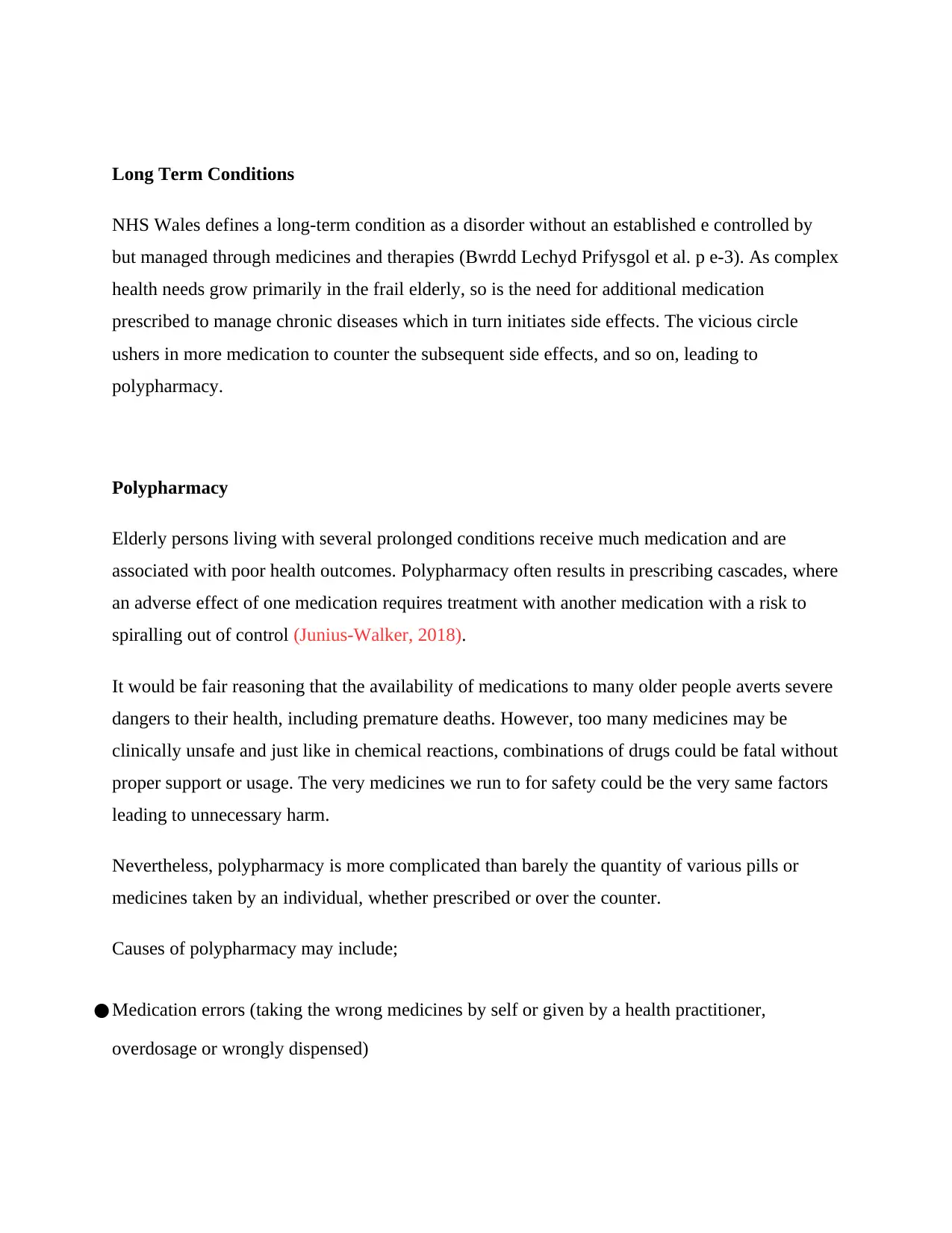
Long Term Conditions
NHS Wales defines a long-term condition as a disorder without an established e controlled by
but managed through medicines and therapies (Bwrdd Lechyd Prifysgol et al. p e-3). As complex
health needs grow primarily in the frail elderly, so is the need for additional medication
prescribed to manage chronic diseases which in turn initiates side effects. The vicious circle
ushers in more medication to counter the subsequent side effects, and so on, leading to
polypharmacy.
Polypharmacy
Elderly persons living with several prolonged conditions receive much medication and are
associated with poor health outcomes. Polypharmacy often results in prescribing cascades, where
an adverse effect of one medication requires treatment with another medication with a risk to
spiralling out of control (Junius-Walker, 2018).
It would be fair reasoning that the availability of medications to many older people averts severe
dangers to their health, including premature deaths. However, too many medicines may be
clinically unsafe and just like in chemical reactions, combinations of drugs could be fatal without
proper support or usage. The very medicines we run to for safety could be the very same factors
leading to unnecessary harm.
Nevertheless, polypharmacy is more complicated than barely the quantity of various pills or
medicines taken by an individual, whether prescribed or over the counter.
Causes of polypharmacy may include;
● Medication errors (taking the wrong medicines by self or given by a health practitioner,
overdosage or wrongly dispensed)
NHS Wales defines a long-term condition as a disorder without an established e controlled by
but managed through medicines and therapies (Bwrdd Lechyd Prifysgol et al. p e-3). As complex
health needs grow primarily in the frail elderly, so is the need for additional medication
prescribed to manage chronic diseases which in turn initiates side effects. The vicious circle
ushers in more medication to counter the subsequent side effects, and so on, leading to
polypharmacy.
Polypharmacy
Elderly persons living with several prolonged conditions receive much medication and are
associated with poor health outcomes. Polypharmacy often results in prescribing cascades, where
an adverse effect of one medication requires treatment with another medication with a risk to
spiralling out of control (Junius-Walker, 2018).
It would be fair reasoning that the availability of medications to many older people averts severe
dangers to their health, including premature deaths. However, too many medicines may be
clinically unsafe and just like in chemical reactions, combinations of drugs could be fatal without
proper support or usage. The very medicines we run to for safety could be the very same factors
leading to unnecessary harm.
Nevertheless, polypharmacy is more complicated than barely the quantity of various pills or
medicines taken by an individual, whether prescribed or over the counter.
Causes of polypharmacy may include;
● Medication errors (taking the wrong medicines by self or given by a health practitioner,
overdosage or wrongly dispensed)
Paraphrase This Document
Need a fresh take? Get an instant paraphrase of this document with our AI Paraphraser
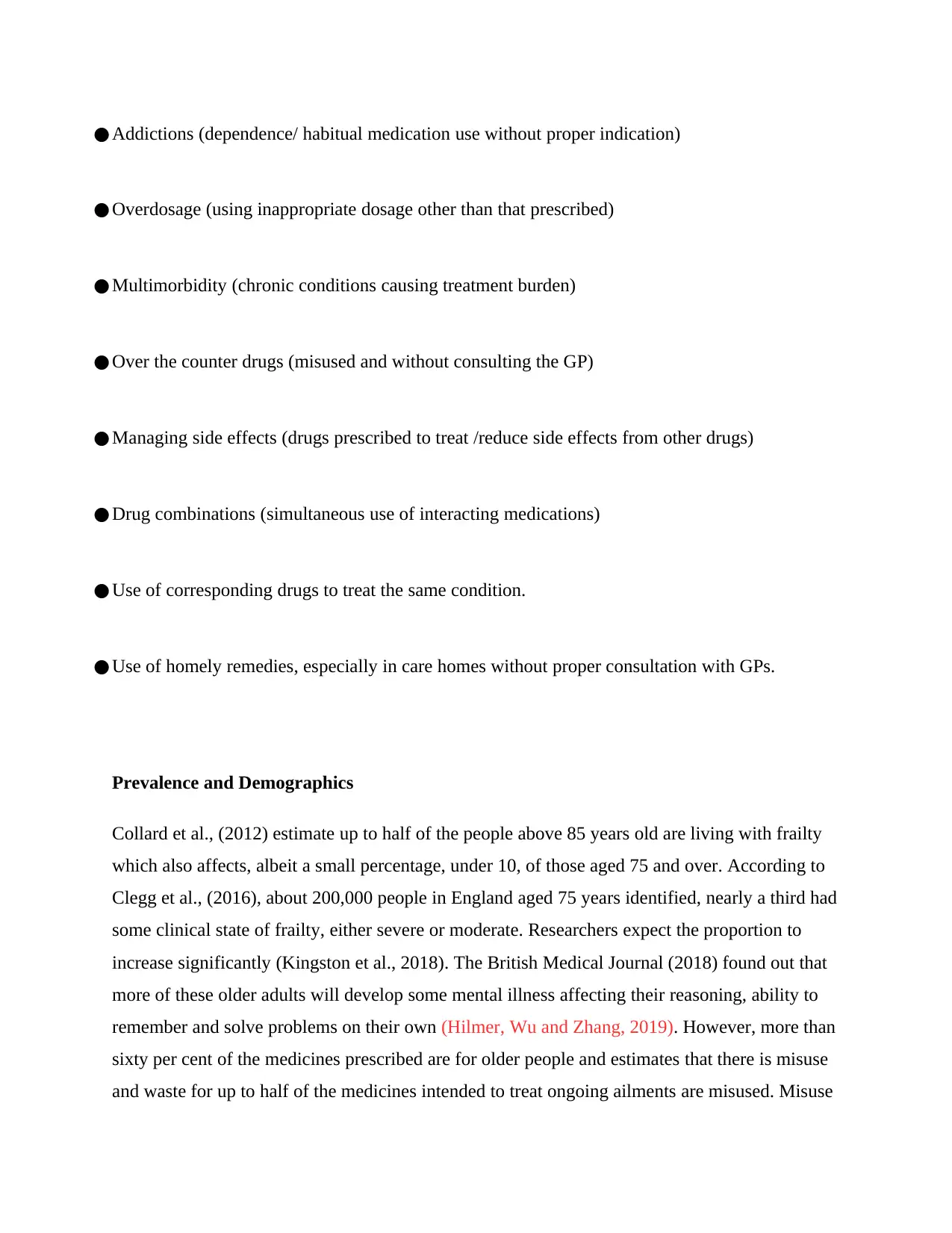
● Addictions (dependence/ habitual medication use without proper indication)
● Overdosage (using inappropriate dosage other than that prescribed)
● Multimorbidity (chronic conditions causing treatment burden)
● Over the counter drugs (misused and without consulting the GP)
● Managing side effects (drugs prescribed to treat /reduce side effects from other drugs)
● Drug combinations (simultaneous use of interacting medications)
● Use of corresponding drugs to treat the same condition.
● Use of homely remedies, especially in care homes without proper consultation with GPs.
Prevalence and Demographics
Collard et al., (2012) estimate up to half of the people above 85 years old are living with frailty
which also affects, albeit a small percentage, under 10, of those aged 75 and over. According to
Clegg et al., (2016), about 200,000 people in England aged 75 years identified, nearly a third had
some clinical state of frailty, either severe or moderate. Researchers expect the proportion to
increase significantly (Kingston et al., 2018). The British Medical Journal (2018) found out that
more of these older adults will develop some mental illness affecting their reasoning, ability to
remember and solve problems on their own (Hilmer, Wu and Zhang, 2019). However, more than
sixty per cent of the medicines prescribed are for older people and estimates that there is misuse
and waste for up to half of the medicines intended to treat ongoing ailments are misused. Misuse
● Overdosage (using inappropriate dosage other than that prescribed)
● Multimorbidity (chronic conditions causing treatment burden)
● Over the counter drugs (misused and without consulting the GP)
● Managing side effects (drugs prescribed to treat /reduce side effects from other drugs)
● Drug combinations (simultaneous use of interacting medications)
● Use of corresponding drugs to treat the same condition.
● Use of homely remedies, especially in care homes without proper consultation with GPs.
Prevalence and Demographics
Collard et al., (2012) estimate up to half of the people above 85 years old are living with frailty
which also affects, albeit a small percentage, under 10, of those aged 75 and over. According to
Clegg et al., (2016), about 200,000 people in England aged 75 years identified, nearly a third had
some clinical state of frailty, either severe or moderate. Researchers expect the proportion to
increase significantly (Kingston et al., 2018). The British Medical Journal (2018) found out that
more of these older adults will develop some mental illness affecting their reasoning, ability to
remember and solve problems on their own (Hilmer, Wu and Zhang, 2019). However, more than
sixty per cent of the medicines prescribed are for older people and estimates that there is misuse
and waste for up to half of the medicines intended to treat ongoing ailments are misused. Misuse
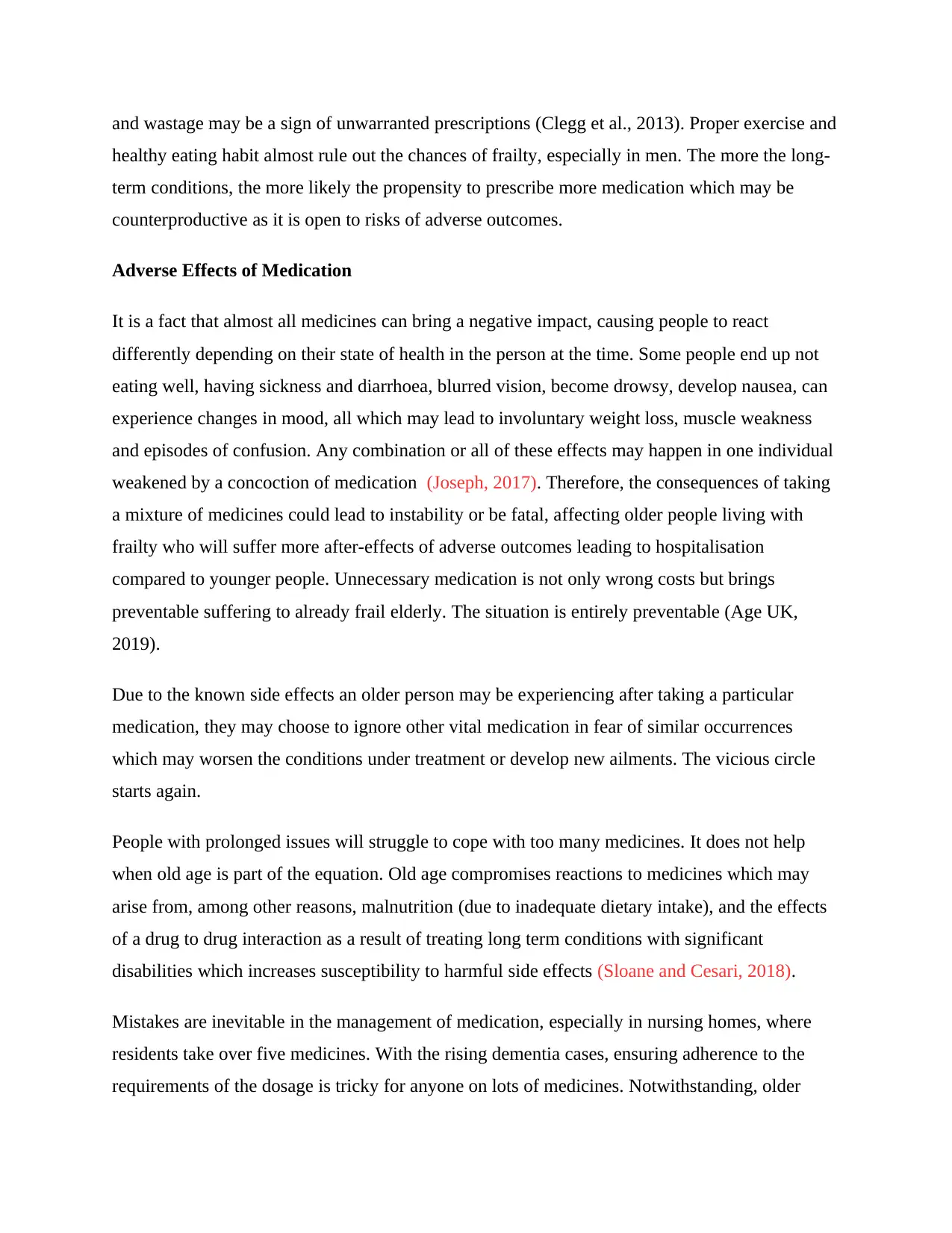
and wastage may be a sign of unwarranted prescriptions (Clegg et al., 2013). Proper exercise and
healthy eating habit almost rule out the chances of frailty, especially in men. The more the long-
term conditions, the more likely the propensity to prescribe more medication which may be
counterproductive as it is open to risks of adverse outcomes.
Adverse Effects of Medication
It is a fact that almost all medicines can bring a negative impact, causing people to react
differently depending on their state of health in the person at the time. Some people end up not
eating well, having sickness and diarrhoea, blurred vision, become drowsy, develop nausea, can
experience changes in mood, all which may lead to involuntary weight loss, muscle weakness
and episodes of confusion. Any combination or all of these effects may happen in one individual
weakened by a concoction of medication (Joseph, 2017). Therefore, the consequences of taking
a mixture of medicines could lead to instability or be fatal, affecting older people living with
frailty who will suffer more after-effects of adverse outcomes leading to hospitalisation
compared to younger people. Unnecessary medication is not only wrong costs but brings
preventable suffering to already frail elderly. The situation is entirely preventable (Age UK,
2019).
Due to the known side effects an older person may be experiencing after taking a particular
medication, they may choose to ignore other vital medication in fear of similar occurrences
which may worsen the conditions under treatment or develop new ailments. The vicious circle
starts again.
People with prolonged issues will struggle to cope with too many medicines. It does not help
when old age is part of the equation. Old age compromises reactions to medicines which may
arise from, among other reasons, malnutrition (due to inadequate dietary intake), and the effects
of a drug to drug interaction as a result of treating long term conditions with significant
disabilities which increases susceptibility to harmful side effects (Sloane and Cesari, 2018).
Mistakes are inevitable in the management of medication, especially in nursing homes, where
residents take over five medicines. With the rising dementia cases, ensuring adherence to the
requirements of the dosage is tricky for anyone on lots of medicines. Notwithstanding, older
healthy eating habit almost rule out the chances of frailty, especially in men. The more the long-
term conditions, the more likely the propensity to prescribe more medication which may be
counterproductive as it is open to risks of adverse outcomes.
Adverse Effects of Medication
It is a fact that almost all medicines can bring a negative impact, causing people to react
differently depending on their state of health in the person at the time. Some people end up not
eating well, having sickness and diarrhoea, blurred vision, become drowsy, develop nausea, can
experience changes in mood, all which may lead to involuntary weight loss, muscle weakness
and episodes of confusion. Any combination or all of these effects may happen in one individual
weakened by a concoction of medication (Joseph, 2017). Therefore, the consequences of taking
a mixture of medicines could lead to instability or be fatal, affecting older people living with
frailty who will suffer more after-effects of adverse outcomes leading to hospitalisation
compared to younger people. Unnecessary medication is not only wrong costs but brings
preventable suffering to already frail elderly. The situation is entirely preventable (Age UK,
2019).
Due to the known side effects an older person may be experiencing after taking a particular
medication, they may choose to ignore other vital medication in fear of similar occurrences
which may worsen the conditions under treatment or develop new ailments. The vicious circle
starts again.
People with prolonged issues will struggle to cope with too many medicines. It does not help
when old age is part of the equation. Old age compromises reactions to medicines which may
arise from, among other reasons, malnutrition (due to inadequate dietary intake), and the effects
of a drug to drug interaction as a result of treating long term conditions with significant
disabilities which increases susceptibility to harmful side effects (Sloane and Cesari, 2018).
Mistakes are inevitable in the management of medication, especially in nursing homes, where
residents take over five medicines. With the rising dementia cases, ensuring adherence to the
requirements of the dosage is tricky for anyone on lots of medicines. Notwithstanding, older
⊘ This is a preview!⊘
Do you want full access?
Subscribe today to unlock all pages.

Trusted by 1+ million students worldwide
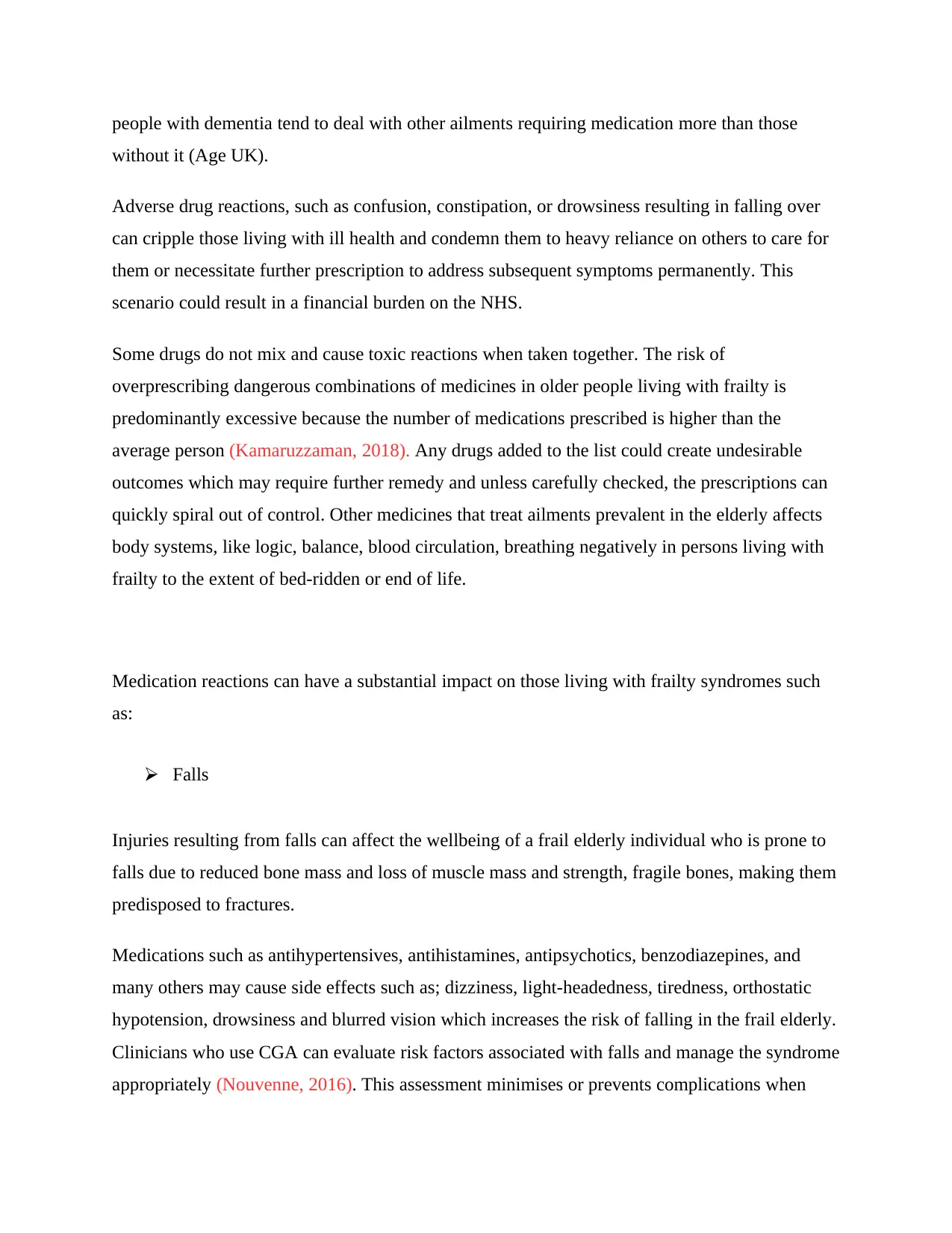
people with dementia tend to deal with other ailments requiring medication more than those
without it (Age UK).
Adverse drug reactions, such as confusion, constipation, or drowsiness resulting in falling over
can cripple those living with ill health and condemn them to heavy reliance on others to care for
them or necessitate further prescription to address subsequent symptoms permanently. This
scenario could result in a financial burden on the NHS.
Some drugs do not mix and cause toxic reactions when taken together. The risk of
overprescribing dangerous combinations of medicines in older people living with frailty is
predominantly excessive because the number of medications prescribed is higher than the
average person (Kamaruzzaman, 2018). Any drugs added to the list could create undesirable
outcomes which may require further remedy and unless carefully checked, the prescriptions can
quickly spiral out of control. Other medicines that treat ailments prevalent in the elderly affects
body systems, like logic, balance, blood circulation, breathing negatively in persons living with
frailty to the extent of bed-ridden or end of life.
Medication reactions can have a substantial impact on those living with frailty syndromes such
as:
⮚ Falls
Injuries resulting from falls can affect the wellbeing of a frail elderly individual who is prone to
falls due to reduced bone mass and loss of muscle mass and strength, fragile bones, making them
predisposed to fractures.
Medications such as antihypertensives, antihistamines, antipsychotics, benzodiazepines, and
many others may cause side effects such as; dizziness, light-headedness, tiredness, orthostatic
hypotension, drowsiness and blurred vision which increases the risk of falling in the frail elderly.
Clinicians who use CGA can evaluate risk factors associated with falls and manage the syndrome
appropriately (Nouvenne, 2016). This assessment minimises or prevents complications when
without it (Age UK).
Adverse drug reactions, such as confusion, constipation, or drowsiness resulting in falling over
can cripple those living with ill health and condemn them to heavy reliance on others to care for
them or necessitate further prescription to address subsequent symptoms permanently. This
scenario could result in a financial burden on the NHS.
Some drugs do not mix and cause toxic reactions when taken together. The risk of
overprescribing dangerous combinations of medicines in older people living with frailty is
predominantly excessive because the number of medications prescribed is higher than the
average person (Kamaruzzaman, 2018). Any drugs added to the list could create undesirable
outcomes which may require further remedy and unless carefully checked, the prescriptions can
quickly spiral out of control. Other medicines that treat ailments prevalent in the elderly affects
body systems, like logic, balance, blood circulation, breathing negatively in persons living with
frailty to the extent of bed-ridden or end of life.
Medication reactions can have a substantial impact on those living with frailty syndromes such
as:
⮚ Falls
Injuries resulting from falls can affect the wellbeing of a frail elderly individual who is prone to
falls due to reduced bone mass and loss of muscle mass and strength, fragile bones, making them
predisposed to fractures.
Medications such as antihypertensives, antihistamines, antipsychotics, benzodiazepines, and
many others may cause side effects such as; dizziness, light-headedness, tiredness, orthostatic
hypotension, drowsiness and blurred vision which increases the risk of falling in the frail elderly.
Clinicians who use CGA can evaluate risk factors associated with falls and manage the syndrome
appropriately (Nouvenne, 2016). This assessment minimises or prevents complications when
Paraphrase This Document
Need a fresh take? Get an instant paraphrase of this document with our AI Paraphraser
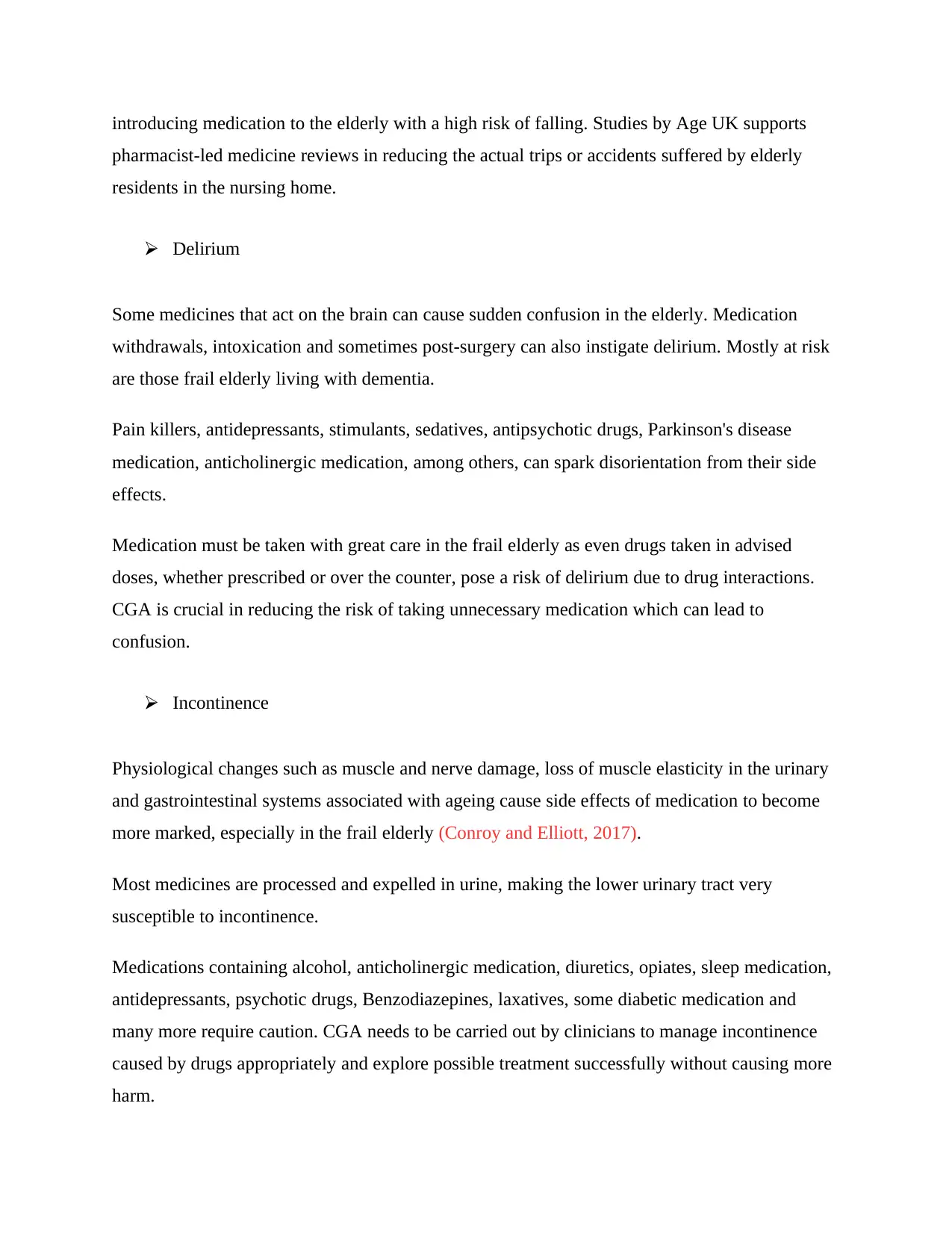
introducing medication to the elderly with a high risk of falling. Studies by Age UK supports
pharmacist-led medicine reviews in reducing the actual trips or accidents suffered by elderly
residents in the nursing home.
⮚ Delirium
Some medicines that act on the brain can cause sudden confusion in the elderly. Medication
withdrawals, intoxication and sometimes post-surgery can also instigate delirium. Mostly at risk
are those frail elderly living with dementia.
Pain killers, antidepressants, stimulants, sedatives, antipsychotic drugs, Parkinson's disease
medication, anticholinergic medication, among others, can spark disorientation from their side
effects.
Medication must be taken with great care in the frail elderly as even drugs taken in advised
doses, whether prescribed or over the counter, pose a risk of delirium due to drug interactions.
CGA is crucial in reducing the risk of taking unnecessary medication which can lead to
confusion.
⮚ Incontinence
Physiological changes such as muscle and nerve damage, loss of muscle elasticity in the urinary
and gastrointestinal systems associated with ageing cause side effects of medication to become
more marked, especially in the frail elderly (Conroy and Elliott, 2017).
Most medicines are processed and expelled in urine, making the lower urinary tract very
susceptible to incontinence.
Medications containing alcohol, anticholinergic medication, diuretics, opiates, sleep medication,
antidepressants, psychotic drugs, Benzodiazepines, laxatives, some diabetic medication and
many more require caution. CGA needs to be carried out by clinicians to manage incontinence
caused by drugs appropriately and explore possible treatment successfully without causing more
harm.
pharmacist-led medicine reviews in reducing the actual trips or accidents suffered by elderly
residents in the nursing home.
⮚ Delirium
Some medicines that act on the brain can cause sudden confusion in the elderly. Medication
withdrawals, intoxication and sometimes post-surgery can also instigate delirium. Mostly at risk
are those frail elderly living with dementia.
Pain killers, antidepressants, stimulants, sedatives, antipsychotic drugs, Parkinson's disease
medication, anticholinergic medication, among others, can spark disorientation from their side
effects.
Medication must be taken with great care in the frail elderly as even drugs taken in advised
doses, whether prescribed or over the counter, pose a risk of delirium due to drug interactions.
CGA is crucial in reducing the risk of taking unnecessary medication which can lead to
confusion.
⮚ Incontinence
Physiological changes such as muscle and nerve damage, loss of muscle elasticity in the urinary
and gastrointestinal systems associated with ageing cause side effects of medication to become
more marked, especially in the frail elderly (Conroy and Elliott, 2017).
Most medicines are processed and expelled in urine, making the lower urinary tract very
susceptible to incontinence.
Medications containing alcohol, anticholinergic medication, diuretics, opiates, sleep medication,
antidepressants, psychotic drugs, Benzodiazepines, laxatives, some diabetic medication and
many more require caution. CGA needs to be carried out by clinicians to manage incontinence
caused by drugs appropriately and explore possible treatment successfully without causing more
harm.
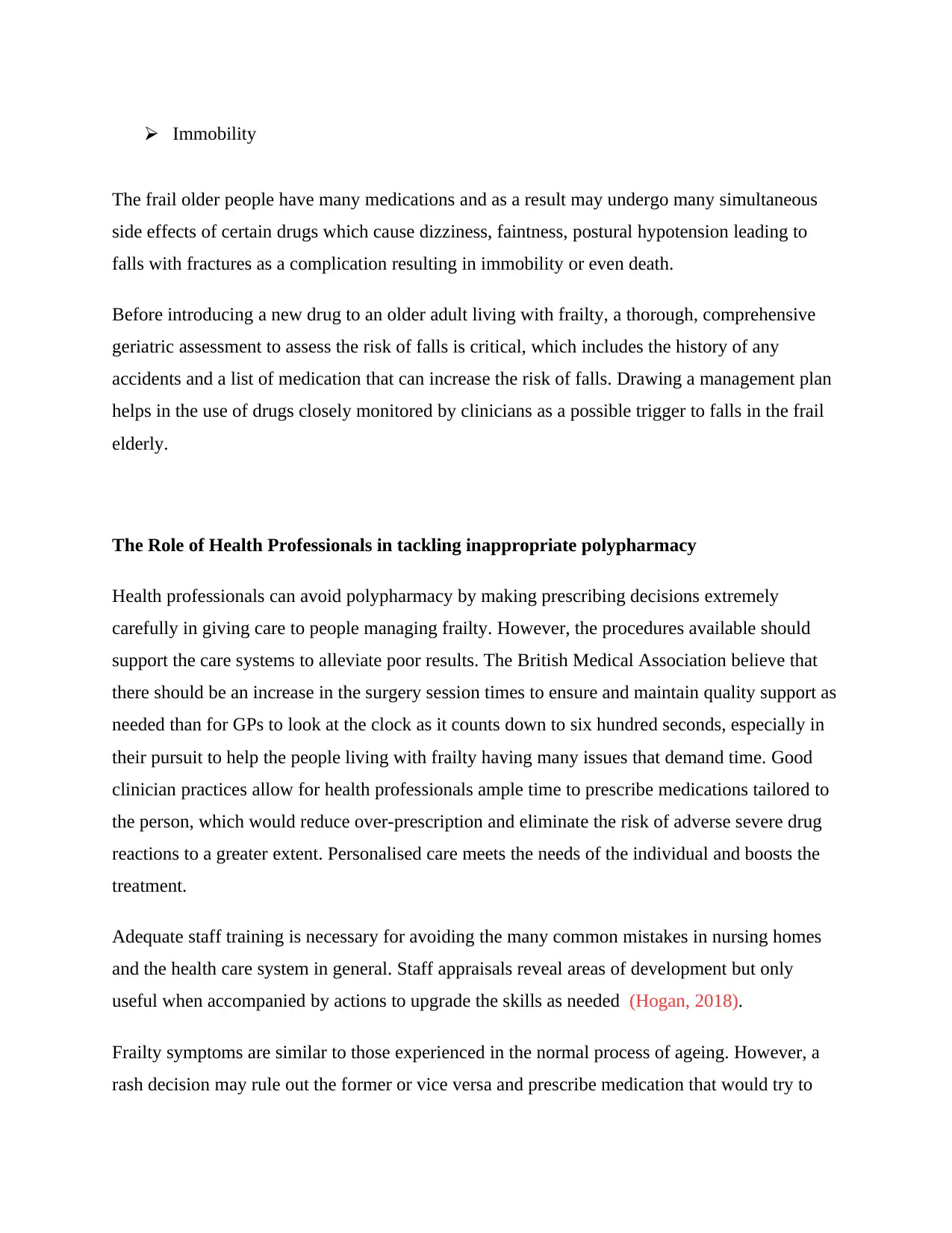
⮚ Immobility
The frail older people have many medications and as a result may undergo many simultaneous
side effects of certain drugs which cause dizziness, faintness, postural hypotension leading to
falls with fractures as a complication resulting in immobility or even death.
Before introducing a new drug to an older adult living with frailty, a thorough, comprehensive
geriatric assessment to assess the risk of falls is critical, which includes the history of any
accidents and a list of medication that can increase the risk of falls. Drawing a management plan
helps in the use of drugs closely monitored by clinicians as a possible trigger to falls in the frail
elderly.
The Role of Health Professionals in tackling inappropriate polypharmacy
Health professionals can avoid polypharmacy by making prescribing decisions extremely
carefully in giving care to people managing frailty. However, the procedures available should
support the care systems to alleviate poor results. The British Medical Association believe that
there should be an increase in the surgery session times to ensure and maintain quality support as
needed than for GPs to look at the clock as it counts down to six hundred seconds, especially in
their pursuit to help the people living with frailty having many issues that demand time. Good
clinician practices allow for health professionals ample time to prescribe medications tailored to
the person, which would reduce over-prescription and eliminate the risk of adverse severe drug
reactions to a greater extent. Personalised care meets the needs of the individual and boosts the
treatment.
Adequate staff training is necessary for avoiding the many common mistakes in nursing homes
and the health care system in general. Staff appraisals reveal areas of development but only
useful when accompanied by actions to upgrade the skills as needed (Hogan, 2018).
Frailty symptoms are similar to those experienced in the normal process of ageing. However, a
rash decision may rule out the former or vice versa and prescribe medication that would try to
The frail older people have many medications and as a result may undergo many simultaneous
side effects of certain drugs which cause dizziness, faintness, postural hypotension leading to
falls with fractures as a complication resulting in immobility or even death.
Before introducing a new drug to an older adult living with frailty, a thorough, comprehensive
geriatric assessment to assess the risk of falls is critical, which includes the history of any
accidents and a list of medication that can increase the risk of falls. Drawing a management plan
helps in the use of drugs closely monitored by clinicians as a possible trigger to falls in the frail
elderly.
The Role of Health Professionals in tackling inappropriate polypharmacy
Health professionals can avoid polypharmacy by making prescribing decisions extremely
carefully in giving care to people managing frailty. However, the procedures available should
support the care systems to alleviate poor results. The British Medical Association believe that
there should be an increase in the surgery session times to ensure and maintain quality support as
needed than for GPs to look at the clock as it counts down to six hundred seconds, especially in
their pursuit to help the people living with frailty having many issues that demand time. Good
clinician practices allow for health professionals ample time to prescribe medications tailored to
the person, which would reduce over-prescription and eliminate the risk of adverse severe drug
reactions to a greater extent. Personalised care meets the needs of the individual and boosts the
treatment.
Adequate staff training is necessary for avoiding the many common mistakes in nursing homes
and the health care system in general. Staff appraisals reveal areas of development but only
useful when accompanied by actions to upgrade the skills as needed (Hogan, 2018).
Frailty symptoms are similar to those experienced in the normal process of ageing. However, a
rash decision may rule out the former or vice versa and prescribe medication that would try to
⊘ This is a preview!⊘
Do you want full access?
Subscribe today to unlock all pages.

Trusted by 1+ million students worldwide
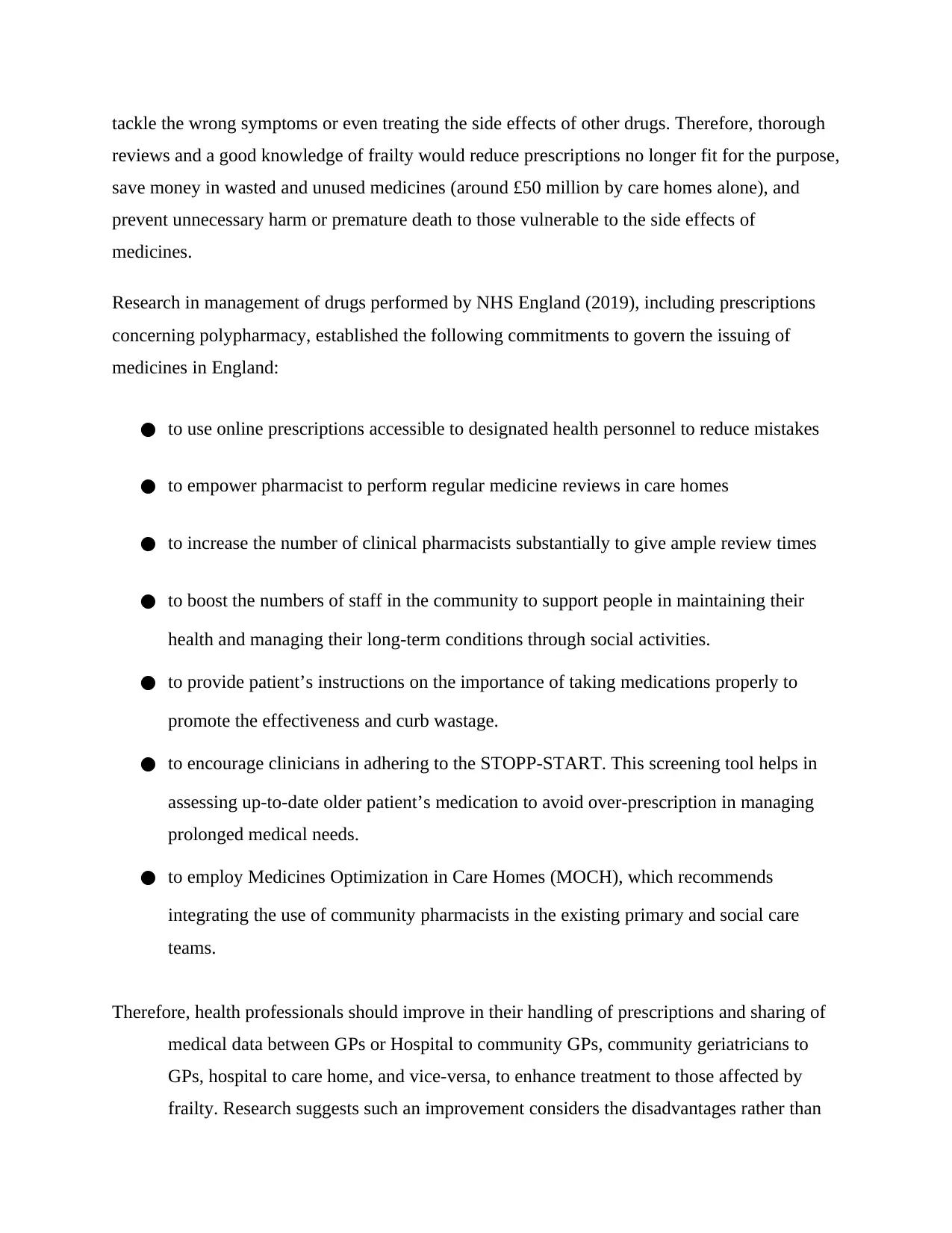
tackle the wrong symptoms or even treating the side effects of other drugs. Therefore, thorough
reviews and a good knowledge of frailty would reduce prescriptions no longer fit for the purpose,
save money in wasted and unused medicines (around £50 million by care homes alone), and
prevent unnecessary harm or premature death to those vulnerable to the side effects of
medicines.
Research in management of drugs performed by NHS England (2019), including prescriptions
concerning polypharmacy, established the following commitments to govern the issuing of
medicines in England:
● to use online prescriptions accessible to designated health personnel to reduce mistakes
● to empower pharmacist to perform regular medicine reviews in care homes
● to increase the number of clinical pharmacists substantially to give ample review times
● to boost the numbers of staff in the community to support people in maintaining their
health and managing their long-term conditions through social activities.
● to provide patient’s instructions on the importance of taking medications properly to
promote the effectiveness and curb wastage.
● to encourage clinicians in adhering to the STOPP-START. This screening tool helps in
assessing up-to-date older patient’s medication to avoid over-prescription in managing
prolonged medical needs.
● to employ Medicines Optimization in Care Homes (MOCH), which recommends
integrating the use of community pharmacists in the existing primary and social care
teams.
Therefore, health professionals should improve in their handling of prescriptions and sharing of
medical data between GPs or Hospital to community GPs, community geriatricians to
GPs, hospital to care home, and vice-versa, to enhance treatment to those affected by
frailty. Research suggests such an improvement considers the disadvantages rather than
reviews and a good knowledge of frailty would reduce prescriptions no longer fit for the purpose,
save money in wasted and unused medicines (around £50 million by care homes alone), and
prevent unnecessary harm or premature death to those vulnerable to the side effects of
medicines.
Research in management of drugs performed by NHS England (2019), including prescriptions
concerning polypharmacy, established the following commitments to govern the issuing of
medicines in England:
● to use online prescriptions accessible to designated health personnel to reduce mistakes
● to empower pharmacist to perform regular medicine reviews in care homes
● to increase the number of clinical pharmacists substantially to give ample review times
● to boost the numbers of staff in the community to support people in maintaining their
health and managing their long-term conditions through social activities.
● to provide patient’s instructions on the importance of taking medications properly to
promote the effectiveness and curb wastage.
● to encourage clinicians in adhering to the STOPP-START. This screening tool helps in
assessing up-to-date older patient’s medication to avoid over-prescription in managing
prolonged medical needs.
● to employ Medicines Optimization in Care Homes (MOCH), which recommends
integrating the use of community pharmacists in the existing primary and social care
teams.
Therefore, health professionals should improve in their handling of prescriptions and sharing of
medical data between GPs or Hospital to community GPs, community geriatricians to
GPs, hospital to care home, and vice-versa, to enhance treatment to those affected by
frailty. Research suggests such an improvement considers the disadvantages rather than
Paraphrase This Document
Need a fresh take? Get an instant paraphrase of this document with our AI Paraphraser
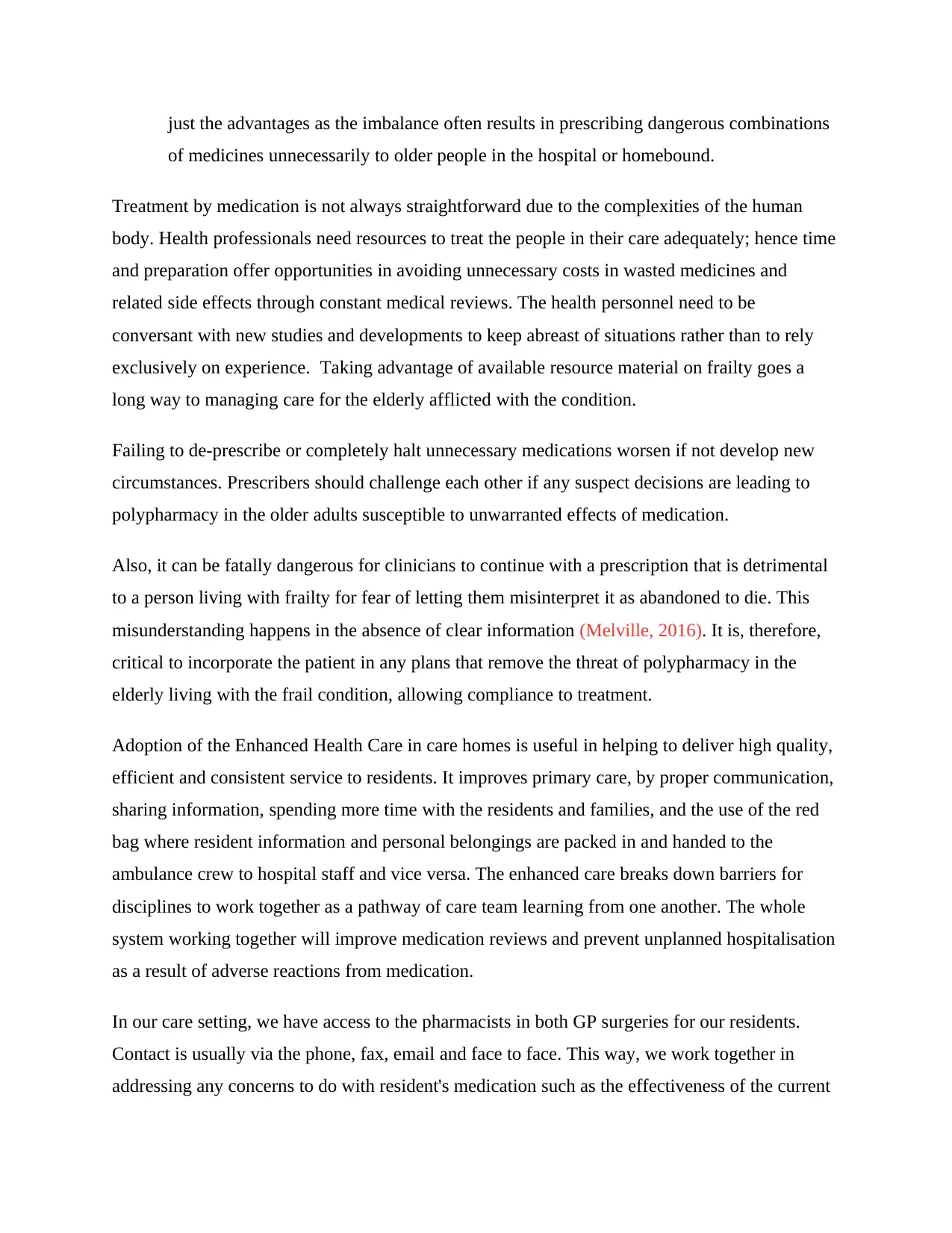
just the advantages as the imbalance often results in prescribing dangerous combinations
of medicines unnecessarily to older people in the hospital or homebound.
Treatment by medication is not always straightforward due to the complexities of the human
body. Health professionals need resources to treat the people in their care adequately; hence time
and preparation offer opportunities in avoiding unnecessary costs in wasted medicines and
related side effects through constant medical reviews. The health personnel need to be
conversant with new studies and developments to keep abreast of situations rather than to rely
exclusively on experience. Taking advantage of available resource material on frailty goes a
long way to managing care for the elderly afflicted with the condition.
Failing to de-prescribe or completely halt unnecessary medications worsen if not develop new
circumstances. Prescribers should challenge each other if any suspect decisions are leading to
polypharmacy in the older adults susceptible to unwarranted effects of medication.
Also, it can be fatally dangerous for clinicians to continue with a prescription that is detrimental
to a person living with frailty for fear of letting them misinterpret it as abandoned to die. This
misunderstanding happens in the absence of clear information (Melville, 2016). It is, therefore,
critical to incorporate the patient in any plans that remove the threat of polypharmacy in the
elderly living with the frail condition, allowing compliance to treatment.
Adoption of the Enhanced Health Care in care homes is useful in helping to deliver high quality,
efficient and consistent service to residents. It improves primary care, by proper communication,
sharing information, spending more time with the residents and families, and the use of the red
bag where resident information and personal belongings are packed in and handed to the
ambulance crew to hospital staff and vice versa. The enhanced care breaks down barriers for
disciplines to work together as a pathway of care team learning from one another. The whole
system working together will improve medication reviews and prevent unplanned hospitalisation
as a result of adverse reactions from medication.
In our care setting, we have access to the pharmacists in both GP surgeries for our residents.
Contact is usually via the phone, fax, email and face to face. This way, we work together in
addressing any concerns to do with resident's medication such as the effectiveness of the current
of medicines unnecessarily to older people in the hospital or homebound.
Treatment by medication is not always straightforward due to the complexities of the human
body. Health professionals need resources to treat the people in their care adequately; hence time
and preparation offer opportunities in avoiding unnecessary costs in wasted medicines and
related side effects through constant medical reviews. The health personnel need to be
conversant with new studies and developments to keep abreast of situations rather than to rely
exclusively on experience. Taking advantage of available resource material on frailty goes a
long way to managing care for the elderly afflicted with the condition.
Failing to de-prescribe or completely halt unnecessary medications worsen if not develop new
circumstances. Prescribers should challenge each other if any suspect decisions are leading to
polypharmacy in the older adults susceptible to unwarranted effects of medication.
Also, it can be fatally dangerous for clinicians to continue with a prescription that is detrimental
to a person living with frailty for fear of letting them misinterpret it as abandoned to die. This
misunderstanding happens in the absence of clear information (Melville, 2016). It is, therefore,
critical to incorporate the patient in any plans that remove the threat of polypharmacy in the
elderly living with the frail condition, allowing compliance to treatment.
Adoption of the Enhanced Health Care in care homes is useful in helping to deliver high quality,
efficient and consistent service to residents. It improves primary care, by proper communication,
sharing information, spending more time with the residents and families, and the use of the red
bag where resident information and personal belongings are packed in and handed to the
ambulance crew to hospital staff and vice versa. The enhanced care breaks down barriers for
disciplines to work together as a pathway of care team learning from one another. The whole
system working together will improve medication reviews and prevent unplanned hospitalisation
as a result of adverse reactions from medication.
In our care setting, we have access to the pharmacists in both GP surgeries for our residents.
Contact is usually via the phone, fax, email and face to face. This way, we work together in
addressing any concerns to do with resident's medication such as the effectiveness of the current
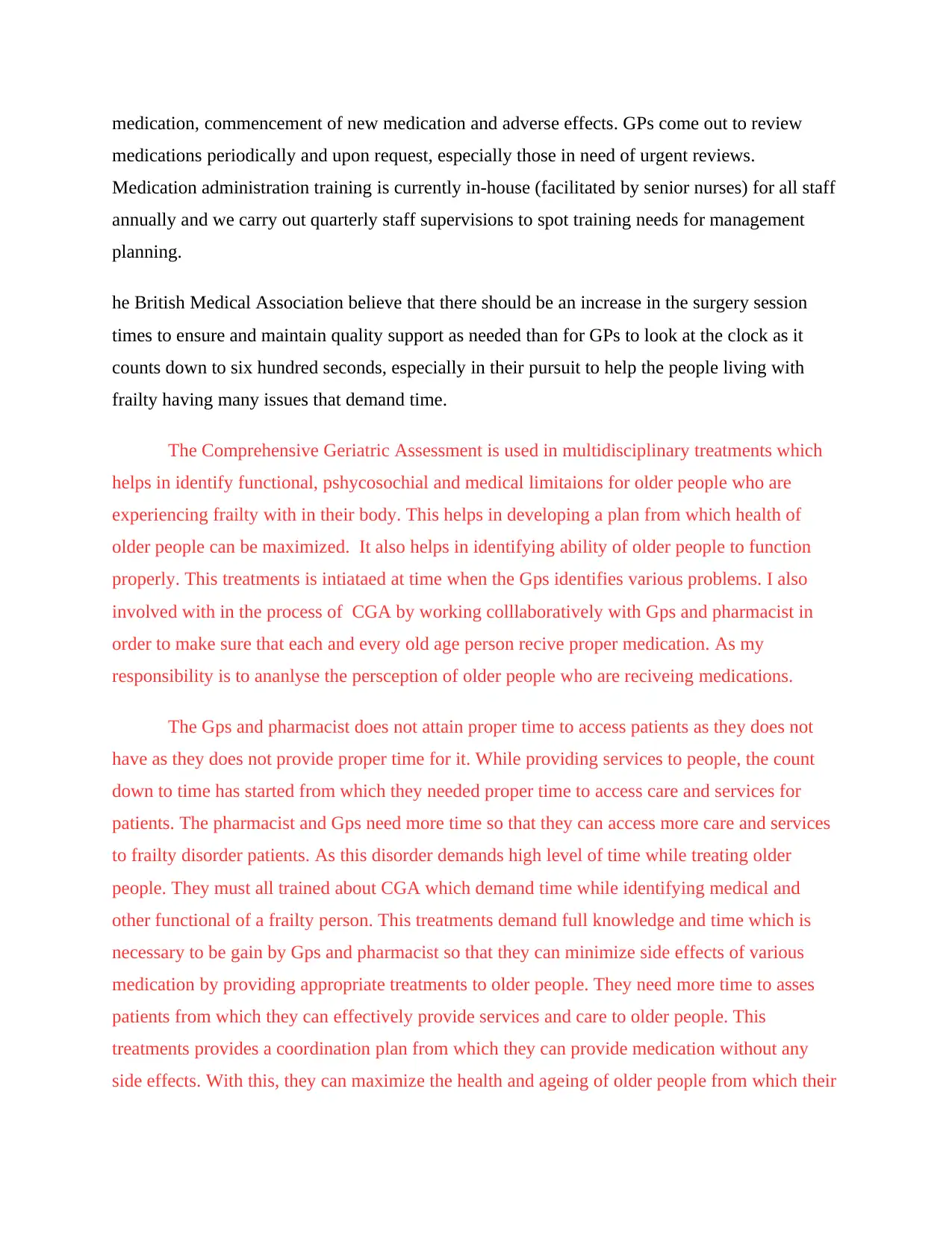
medication, commencement of new medication and adverse effects. GPs come out to review
medications periodically and upon request, especially those in need of urgent reviews.
Medication administration training is currently in-house (facilitated by senior nurses) for all staff
annually and we carry out quarterly staff supervisions to spot training needs for management
planning.
he British Medical Association believe that there should be an increase in the surgery session
times to ensure and maintain quality support as needed than for GPs to look at the clock as it
counts down to six hundred seconds, especially in their pursuit to help the people living with
frailty having many issues that demand time.
The Comprehensive Geriatric Assessment is used in multidisciplinary treatments which
helps in identify functional, pshycosochial and medical limitaions for older people who are
experiencing frailty with in their body. This helps in developing a plan from which health of
older people can be maximized. It also helps in identifying ability of older people to function
properly. This treatments is intiataed at time when the Gps identifies various problems. I also
involved with in the process of CGA by working colllaboratively with Gps and pharmacist in
order to make sure that each and every old age person recive proper medication. As my
responsibility is to ananlyse the persception of older people who are reciveing medications.
The Gps and pharmacist does not attain proper time to access patients as they does not
have as they does not provide proper time for it. While providing services to people, the count
down to time has started from which they needed proper time to access care and services for
patients. The pharmacist and Gps need more time so that they can access more care and services
to frailty disorder patients. As this disorder demands high level of time while treating older
people. They must all trained about CGA which demand time while identifying medical and
other functional of a frailty person. This treatments demand full knowledge and time which is
necessary to be gain by Gps and pharmacist so that they can minimize side effects of various
medication by providing appropriate treatments to older people. They need more time to asses
patients from which they can effectively provide services and care to older people. This
treatments provides a coordination plan from which they can provide medication without any
side effects. With this, they can maximize the health and ageing of older people from which their
medications periodically and upon request, especially those in need of urgent reviews.
Medication administration training is currently in-house (facilitated by senior nurses) for all staff
annually and we carry out quarterly staff supervisions to spot training needs for management
planning.
he British Medical Association believe that there should be an increase in the surgery session
times to ensure and maintain quality support as needed than for GPs to look at the clock as it
counts down to six hundred seconds, especially in their pursuit to help the people living with
frailty having many issues that demand time.
The Comprehensive Geriatric Assessment is used in multidisciplinary treatments which
helps in identify functional, pshycosochial and medical limitaions for older people who are
experiencing frailty with in their body. This helps in developing a plan from which health of
older people can be maximized. It also helps in identifying ability of older people to function
properly. This treatments is intiataed at time when the Gps identifies various problems. I also
involved with in the process of CGA by working colllaboratively with Gps and pharmacist in
order to make sure that each and every old age person recive proper medication. As my
responsibility is to ananlyse the persception of older people who are reciveing medications.
The Gps and pharmacist does not attain proper time to access patients as they does not
have as they does not provide proper time for it. While providing services to people, the count
down to time has started from which they needed proper time to access care and services for
patients. The pharmacist and Gps need more time so that they can access more care and services
to frailty disorder patients. As this disorder demands high level of time while treating older
people. They must all trained about CGA which demand time while identifying medical and
other functional of a frailty person. This treatments demand full knowledge and time which is
necessary to be gain by Gps and pharmacist so that they can minimize side effects of various
medication by providing appropriate treatments to older people. They need more time to asses
patients from which they can effectively provide services and care to older people. This
treatments provides a coordination plan from which they can provide medication without any
side effects. With this, they can maximize the health and ageing of older people from which their
⊘ This is a preview!⊘
Do you want full access?
Subscribe today to unlock all pages.

Trusted by 1+ million students worldwide
1 out of 19
Related Documents
Your All-in-One AI-Powered Toolkit for Academic Success.
+13062052269
info@desklib.com
Available 24*7 on WhatsApp / Email
![[object Object]](/_next/static/media/star-bottom.7253800d.svg)
Unlock your academic potential
Copyright © 2020–2026 A2Z Services. All Rights Reserved. Developed and managed by ZUCOL.





